
- The Tragedies - The Comedies - The Histories - The Sonnets
- The Life of Shakespeare - The Times of William Shakespeare - The Characters from Shakespeare - Stories and Plots
- Quotes from Shakespeare - Doubtful Works - Site Map - More ...
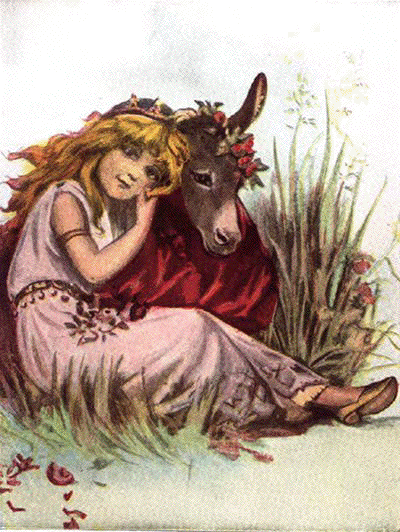
|
|
A MIDSUMMER NIGHT'S DREAM
Hermia and Lysander were lovers; but Hermia's father wished her
to marry another man, named Demetrius.
Now, in Athens, where they lived, there was a wicked law, by which any girl who refused to marry according to her father's wishes, might be put to death. Hermia's father was so angry with her for refusing to do as he wished, that he actually brought her before the Duke of Athens to ask that she might be killed, if she still refused to obey him. The Duke gave her four days to think about it, and, at the end of that time, if she still refused to marry Demetrius, she would have to die.
Lysander of course was nearly mad with grief, and the best thing to do seemed to him for Hermia to run away to his aunt's house at a place beyond the reach of that cruel law; and there he would come to her and marry her. But before she started, she told her friend, Helena, what she was going to do.
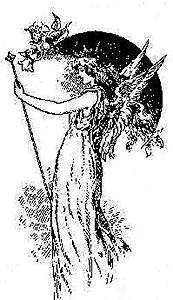 Helena had been Demetrius'
sweetheart long before his marriage with Hermia had been thought
of, and being very silly, like all jealous people, she could not
see that it was not poor Hermia's fault that Demetrius wished to
marry her instead of his own lady, Helena. She knew that if she
told Demetrius that Hermia was going, as she was, to the wood
outside Athens, he would follow her, "and I can follow him, and
at least I shall see him," she said to herself. So she went to
him, and betrayed her friend's secret.
Helena had been Demetrius'
sweetheart long before his marriage with Hermia had been thought
of, and being very silly, like all jealous people, she could not
see that it was not poor Hermia's fault that Demetrius wished to
marry her instead of his own lady, Helena. She knew that if she
told Demetrius that Hermia was going, as she was, to the wood
outside Athens, he would follow her, "and I can follow him, and
at least I shall see him," she said to herself. So she went to
him, and betrayed her friend's secret.
Now this wood where Lysander was to meet Hermia, and where the other two had decided to follow them, was full of fairies, as most woods are, if one only had the eyes to see them, and in this wood on this night were the King and Queen of the fairies, Oberon and Titania. Now fairies are very wise people, but now and then they can be quite as foolish as mortal folk. Oberon and Titania, who might have been as happy as the days were long, had thrown away all their joy in a foolish quarrel. They never met without saying disagreeable things to each other, and scolded each other so dreadfully that all their little fairy followers, for fear, would creep into acorn cups and hide them there.
So, instead of keeping one happy Court and dancing all night through in the moonlight as is fairies' use, the King with his attendants wandered through one part of the wood, while the Queen with hers kept state in another. And the cause of all this trouble was a little Indian boy whom Titania had taken to be one of her followers. Oberon wanted the child to follow him and be one of his fairy knights; but the Queen would not give him up.
On this night, in a mossy moonlit glade, the King and Queen of the fairies met.
"Ill met by moonlight, proud Titania," said the King.
"What! jealous, Oberon?" answered the Queen. "You spoil everything with your quarreling. Come, fairies, let us leave him. I am not friends with him now."
"It rests with you to make up the quarrel," said the King.
"Give me that little Indian boy, and I will again be your humble servant and suitor."
"Set your mind at rest," said the Queen. "Your whole fairy kingdom buys not that boy from me. Come, fairies."
And she and her train rode off down the moonbeams.
"Well, go your ways," said Oberon. "But I'll be even with you before you leave this wood."
Then Oberon called his favorite fairy, Puck. Puck was the spirit of mischief. He used to slip into the dairies and take the cream away, and get into the churn so that the butter would not come, and turn the beer sour, and lead people out of their way on dark nights and then laugh at them, and tumble people's stools from under them when they were going to sit down, and upset their hot ale over their chins when they were going to drink.
"Now," said Oberon to this little sprite, "fetch me the flower called Love-in-idleness. The juice of that little purple flower laid on the eyes of those who sleep will make them, when they wake, to love the first thing they see. I will put some of the juice of that flower on my Titania's eyes, and when she wakes she will love the first thing she sees, were it lion, bear, or wolf, or bull, or meddling monkey, or a busy ape."
While Puck was gone, Demetrius passed through the glade followed by poor Helena, and still she told him how she loved him and reminded him of all his promises, and still he told her that he did not and could not love her, and that his promises were nothing. Oberon was sorry for poor Helena, and when Puck returned with the flower, he bade him follow Demetrius and put some of the juice on his eyes, so that he might love Helena when he woke and looked on her, as much as she loved him. So Puck set off, and wandering through the wood found, not Demetrius, but Lysander, on whose eyes he put the juice; but when Lysander woke, he saw not his own Hermia, but Helena, who was walking through the wood looking for the cruel Demetrius; and directly lie saw her he loved her and left his own lady, under the spell of the purple flower.

When Hermia woke she found Lysander gone, and wandered about the wood trying to find him. Puck went back and told Oberon what lie had done, and Oberon soon found that he had made a mistake, and set about looking for Demetrius, and having found him, put some of the juice on his eyes. And the first thing Demetrius saw when he woke was also Helena. So now Demetrius and Lysander were both following her through the wood, and it was Hermia's turn to follow her lover as Helena had done before. The end of it was that Helena and Hermia began to quarrel, and Demetrius and Lysander went off to fight. Oberon was very sorry to see his kind scheme to help these lovers turn out so badly. So he said to Puck--
"These two young men are going to fight. You must overhang the night with drooping fog, and lead them so astray, that one will never find the other. When they are tired out, they will fall asleep. Then drop this other herb on Lysander's eyes. That will give him his old sight and his old love. Then each man will have the lady who loves him, and they will all think that this has been only a Midsummer Night's Dream. Then when this is done, all will be well with them."
So Puck went and did as he was told, and when the two had fallen asleep without meeting each other, Puck poured the juice on Lysander's eyes, and said:--
"When thou wakest,Thou takest
True delight
In the sight
Of thy former lady's eye:
Jack shall have Jill;
Nought shall go ill."
Meanwhile Oberon found Titania asleep on a bank where grew wild
thyme, oxlips, and violets, and woodbine, musk-roses and
eglantine. There Titania always slept a part of the night,
wrapped in the enameled skin of a snake. Oberon stooped over her
and laid the juice on her eyes, saying:--
"What thou seest when thou wake,Do it for thy true love take."
Now, it happened that when Titania woke the first thing she saw
was a stupid clown, one of a party of players who had come out
into the wood to rehearse their play. This clown had met with
Puck, who had clapped an ass's head on his shoulders so that it
looked as if it grew there. Directly Titania woke and saw this
dreadful monster, she said, "What angel is this? Are you as wise
as you are beautiful?"
"If I am wise enough to find my way out of this wood, that's enough for me," said the foolish clown.
"Do not desire to go out of the wood," said Titania. The spell of the love-juice was on her, and to her the clown seemed the most beautiful and delightful creature on all the earth. "I love you," she went on. "Come with me, and I will give you fairies to attend on you."
So she called four fairies, whose names were Peaseblossom, Cobweb, Moth, and Mustardseed.
"You must attend this gentleman," said the Queen. "Feed him with apricots and dewberries, purple grapes, green figs, and mulberries. Steal honey-bags for him from the bumble-bees, and with the wings of painted butterflies fan the moonbeams from his sleeping eyes."
"I will," said one of the fairies, and all the others said, "I will."
"Now, sit down with me," said the Queen to the clown, "and let me stroke your dear cheeks, and stick musk-roses in your smooth, sleek head, and kiss your fair large ears, my gentle joy."
"Where's Peaseblossom?" asked the clown with the ass's head. He did not care much about the Queen's affection, but he was very proud of having fairies to wait on him. "Ready," said Peaseblossom.
"Scratch my head, Peaseblossom," said the clown. "Where's Cobweb?" "Ready," said Cobweb.
"Kill me," said the clown, "the red bumble-bee on the top of the thistle yonder, and bring me the honey-bag. Where's Mustardseed?"
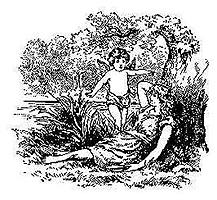
"Oh, I want nothing," said the clown. "Only just help Cobweb to scratch. I must go to the barber's, for methinks I am marvelous hairy about the face."
"Would you like anything to eat?" said the fairy Queen.
"I should like some good dry oats," said the clown--for his donkey's head made him desire donkey's food--"and some hay to follow."
"Shall some of my fairies fetch you new nuts from the squirrel's house?" asked the Queen.
"I'd rather have a handful or two of good dried peas," said the clown. "But please don't let any of your people disturb me; I am going to sleep."
Then said the Queen, "And I will wind thee in my arms."
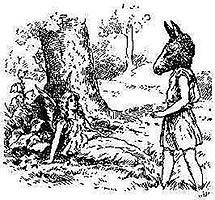
And so when Oberon came along he found his beautiful Queen lavishing kisses and endearments on a clown with a donkey's head.
And before he released her from the enchantment, he persuaded her to give him the little Indian boy he so much desired to have. Then he took pity on her, and threw some juice of the disenchanting flower on her pretty eyes; and then in a moment she saw plainly the donkey-headed clown she had been loving, and knew how foolish she had been.
Oberon took off the ass's head from the clown, and left him to finish his sleep with his own silly head lying on the thyme and violets.
Thus all was made plain and straight again. Oberon and Titania loved each other more than ever. Demetrius thought of no one but Helena, and Helena had never had any thought of anyone but Demetrius.
As for Hermia and Lysander, they were as loving a couple as you could meet in a day's march, even through a fairy wood.
So the four mortal lovers went back to Athens and were married; and the fairy King and Queen live happily together in that very wood at this very day.
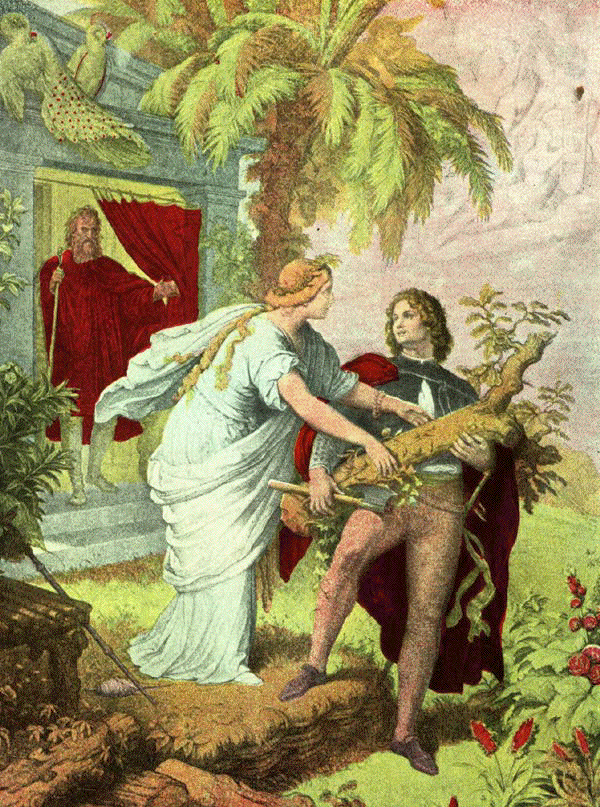
THE TEMPEST
Prospero, the Duke of Milan, was a learned and studious man, who
lived among his books, leaving the management of his dukedom to
his brother Antonio, in whom indeed he had complete trust. But
that trust was ill-rewarded, for Antonio wanted to wear the
duke's crown himself, and, to gain his ends, would have killed
his brother but for the love the people bore him. However, with
the help of Prospero's great enemy, Alonso, King of Naples, he
managed to get into his hands the dukedom with all its honor,
power, and riches. For they took Prospero to sea, and when they
were far away from land, forced him into a little boat with no
tackle, mast, or sail. In their cruelty and hatred they put his
little daughter, Miranda (not yet three years old), into the boat
with him, and sailed away, leaving them to their fate.
But one among the courtiers with Antonio was true to his rightful master, Prospero. To save the duke from his enemies was impossible, but much could be done to remind him of a subject's love. So this worthy lord, whose name was Gonzalo, secretly placed in the boat some fresh water, provisions, and clothes, and what Prospero valued most of all, some of his precious books.
The boat was cast on an island, and Prospero and his little one landed in safety. Now this island was enchanted, and for years had lain under the spell of a fell witch, Sycorax, who had imprisoned in the trunks of trees all the good spirits she found there. She died shortly before Prospero was cast on those shores, but the spirits, of whom Ariel was the chief, still remained in their prisons.
Prospero was a great magician, for he had devoted himself almost entirely to the study of magic during the years in which he allowed his brother to manage the affairs of Milan. By his art he set free the imprisoned spirits, yet kept them obedient to his will, and they were more truly his subjects than his people in Milan had been. For he treated them kindly as long as they did his bidding, and he exercised his power over them wisely and well. One creature alone he found it necessary to treat with harshness: this was Caliban, the son of the wicked old witch, a hideous, deformed monster, horrible to look on, and vicious and brutal in all his habits.
When Miranda was grown up into a maiden, sweet and fair to see, it chanced that Antonio and Alonso, with Sebastian, his brother, and Ferdinand, his son, were at sea together with old Gonzalo, and their ship came near Prospero's island. Prospero, knowing they were there, raised by his art a great storm, so that even the sailors on board gave themselves up for lost; and first among them all Prince Ferdinand leaped into the sea, and, as his father thought in his grief, was drowned. But Ariel brought him safe ashore; and all the rest of the crew, although they were washed overboard, were landed unhurt in different parts of the island, and the good ship herself, which they all thought had been wrecked, lay at anchor in the harbor whither Ariel had brought her. Such wonders could Prospero and his spirits perform.
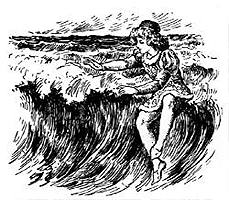
While yet the tempest was raging, Prospero showed his daughter the brave ship laboring in the trough of the sea, and told her that it was filled with living human beings like themselves. She, in pity of their lives, prayed him who had raised this storm to quell it. Then her father bade her to have no fear, for he intended to save every one of them.
Then, for the first time, he told her the story of his life and hers, and that he had caused this storm to rise in order that his enemies, Antonio and Alonso, who were on board, might be delivered into his hands.
When he had made an end of his story he charmed her into sleep, for Ariel was at hand, and he had work for him to do. Ariel, who longed for his complete freedom, grumbled to be kept in drudgery, but on being threateningly reminded of all the sufferings he had undergone when Sycorax ruled in the land, and of the debt of gratitude he owed to the master who had made those sufferings to end, he ceased to complain, and promised faithfully to do whatever Prospero might command.
"Do so," said Prospero, "and in two days I will discharge thee."
Then he bade Ariel take the form of a water nymph and sent him in search of the young prince. And Ariel, invisible to Ferdinand, hovered near him, singing the while--
"Come unto these yellow sandsAnd then take hands:
Court'sied when you have, and kiss'd
(The wild waves whist),
Foot it featly here and there;
And, sweet sprites, the burden bear!"
And Ferdinand followed the magic singing, as the song changed to a solemn air, and the words brought grief to his heart, and tears to his eyes, for thus they ran--
"Full fathom five thy father lies;Of his bones are coral made.
Those are pearls that were his eyes,
Nothing of him that doth fade,
But doth suffer a sea-change
Into something rich and strange.
Sea-nymphs hourly ring his knell.
Hark! now I hear them,-- ding dong bell!"
And so singing, Ariel led the spell-bound prince into the presence of Prospero and Miranda. Then, behold! all happened as Prospero desired. For Miranda, who had never, since she could first remember, seen any human being save her father, looked on the youthful prince with reverence in her eyes, and love in her secret heart.
"I might call him," she said, "a thing divine, for nothing natural I ever saw so noble!"
And Ferdinand, beholding her beauty with wonder and delight, exclaimed--
"Most sure the goddess on whom these airs attend!"
Nor did he attempt to hide the passion which she inspired in him, for scarcely had they exchanged half a dozen sentences, before he vowed to make her his queen if she were willing. But Prospero, though secretly delighted, pretended wrath.
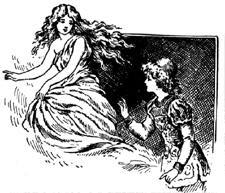
"You come here as a spy," he said to Ferdinand. "I will manacle your neck and feet together, and you shall feed on fresh water mussels, withered roots and husk, and have sea-water to drink. Follow."
"No," said Ferdinand, and drew his sword. But on the instant Prospero charmed him so that he stood there like a statue, still as stone; and Miranda in terror prayed her father to have mercy on her lover. But he harshly refused her, and made Ferdinand follow him to his cell. There he set the Prince to work, making him remove thousands of heavy logs of timber and pile them up; and Ferdinand patiently obeyed, and thought his toil all too well repaid by the sympathy of the sweet Miranda.
She in very pity would have helped him in his hard work, but he would not let her, yet he could not keep from her the secret of his love, and she, hearing it, rejoiced and promised to be his wife.
Then Prospero released him from his servitude, and glad at heart, he gave his consent to their marriage.
"Take her," he said, "she is thine own."
In the meantime, Antonio and Sebastian in another part of the island were plotting the murder of Alonso, the King of Naples, for Ferdinand being dead, as they thought, Sebastian would succeed to the throne on Alonso's death. And they would have carried out their wicked purpose while their victim was asleep, but that Ariel woke him in good time.
Many tricks did Ariel play them. Once he set a banquet before them, and just as they were going to fall to, he appeared to them amid thunder and lightning in the form of a harpy, and immediately the banquet disappeared. Then Ariel upbraided them with their sins and vanished too.
Prospero by his enchantments drew them all to the grove without his cell, where they waited, trembling and afraid, and now at last bitterly repenting them of their sins.
Prospero determined to make one last use of his magic power, "And then," said he, "I'll break my staff and deeper than did ever plummet sound I'll drown my book."
So he made heavenly music to sound in the air, and appeared to them in his proper shape as the Duke of Milan. Because they repented, he forgave them and told them the story of his life since they had cruelly committed him and his baby daughter to the mercy of wind and waves. Alonso, who seemed sorriest of them all for his past crimes, lamented the loss of his heir. But Prospero drew back a curtain and showed them Ferdinand and Miranda playing at chess. Great was Alonso's joy to greet his loved son again, and when he heard that the fair maid with whom Ferdinand was playing was Prospero's daughter, and that the young folks had plighted their troth, he said--
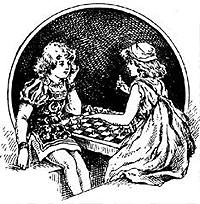
"Give me your hands, let grief and sorrow still embrace his heart that doth not wish you joy."
So all ended happily. The ship was safe in the harbor, and next day they all set sail for Naples, where Ferdinand and Miranda were to be married. Ariel gave them calm seas and auspicious gales; and many were the rejoicings at the wedding.
Then Prospero, after many years of absence, went back to his own dukedom, where he was welcomed with great joy by his faithful subjects. He practiced the arts of magic no more, but his life was happy, and not only because he had found his own again, but chiefly because, when his bitterest foes who had done him deadly wrong lay at his mercy, he took no vengeance on them, but nobly forgave them.
As for Ariel, Prospero made him free as air, so that he could wander where he would, and sing with a light heart his sweet song--
"Where the bee sucks, there suck I:In a cowslip's bell I lie;
There I couch when owls do cry.
On the bat's back I do fly
After summer, merrily:
Merrily, merrily, shall I live now,
Under the blossom that hangs on the bough."
AS YOU LIKE IT
There was once a wicked Duke named Frederick, who took the
dukedom that should have belonged to his brother, sending him
into exile. His brother went into the Forest of Arden, where he
lived the life of a bold forester, as Robin Hood did in Sherwood
Forest in merry England.
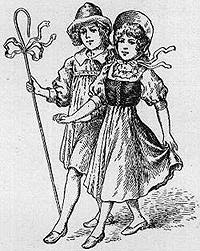
The banished Duke's daughter, Rosalind, remained with Celia, Frederick's daughter, and the two loved each other more than most sisters. One day there was a wrestling match at Court, and Rosalind and Celia went to see it. Charles, a celebrated wrestler, was there, who had killed many men in contests of this kind. Orlando, the young man he was to wrestle with, was so slender and youthful, that Rosalind and Celia thought he would surely be killed, as others had been; so they spoke to him, and asked him not to attempt so dangerous an adventure; but the only effect of their words was to make him wish more to come off well in the encounter, so as to win praise from such sweet ladies.
Orlando, like Rosalind's father, was being kept out of his inheritance by his brother, and was so sad at his brother's unkindness that, until he saw Rosalind, he did not care much whether he lived or died. But now the sight of the fair Rosalind gave him strength and courage, so that he did marvelously, and at last, threw Charles to such a tune, that the wrestler had to be carried off the ground. Duke Frederick was pleased with his courage, and asked his name.
"My name is Orlando, and I am the youngest son of Sir Rowland de Boys," said the young man.
Now Sir Rowland de Boys, when he was alive, had been a good friend to the banished Duke, so that Frederick heard with regret whose son Orlando was, and would not befriend him. But Rosalind was delighted to hear that this handsome young stranger was the son of her father's old friend, and as they were going away, she turned back more than once to say another kind word to the brave young man.
"Gentleman," she said, giving him a chain from her neck, "wear this for me. I could give more, but that my hand lacks means."
Rosalind and Celia, when they were alone, began to talk about the handsome wrestler, and Rosalind confessed that she loved him at first sight.
"Come, come," said Celia, "wrestle with thy affections."
"Oh," answered Rosalind, "they take the part of a better wrestler than myself. Look, here comes the Duke."
"With his eyes full of anger," said Celia.
"You must leave the Court at once," he said to Rosalind. "Why?" she asked.
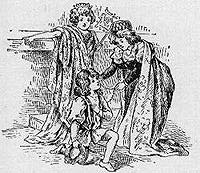
"Never mind why," answered the Duke, "you are banished. If within ten days you are found within twenty miles of my Court, you die."
So Rosalind set out to seek her father, the banished Duke, in the Forest of Arden. Celia loved her too much to let her go alone, and as it was rather a dangerous journey, Rosalind, being the taller, dressed up as a young countryman, and her cousin as a country girl, and Rosalind said that she would be called Ganymede, and Celia, Aliena. They were very tired when at last they came to the Forest of Arden, and as they were sitting on the grass a countryman passed that way, and Ganymede asked him if he could get them food. He did so, and told them that a shepherd's flocks and house were to be sold. They bought these and settled down as shepherd and shepherdess in the forest.
In the meantime, Oliver having sought to take his brother Orlando's life, Orlando also wandered into the forest, and there met with the rightful Duke, and being kindly received, stayed with him. Now, Orlando could think of nothing but Rosalind, and he went about the forest carving her name on trees, and writing love sonnets and hanging them on the bushes, and there Rosalind and Celia found them. One day Orlando met them, but he did not know Rosalind in her boy's clothes, though he liked the pretty shepherd youth, because he fancied a likeness in him to her he loved.
"There is a foolish lover," said Rosalind, "who haunts these woods and hangs sonnets on the trees. If I could find him, I would soon cure him of his folly."
Orlando confessed that he was the foolish lover, and Rosalind said--"If you will come and see me every day, I will pretend to be Rosalind, and I will take her part, and be wayward and contrary, as is the way of women, till I make you ashamed of your folly in loving her."
And so every day he went to her house, and took a pleasure in saying to her all the pretty things he would have said to Rosalind; and she had the fine and secret joy of knowing that all his love-words came to the right ears. Thus many days passed pleasantly away.
One morning, as Orlando was going to visit Ganymede, he saw a man asleep on the ground, and that there was a lioness crouching near, waiting for the man who was asleep to wake: for they say that lions will not prey on anything that is dead or sleeping. Then Orlando looked at the man, and saw that it was his wicked brother, Oliver, who had tried to take his life. He fought with the lioness and killed her, and saved his brother's life.
While Orlando was fighting the lioness, Oliver woke to see his brother, whom he had treated so badly, saving him from a wild beast at the risk of his own life. This made him repent of his wickedness, and he begged Orlando's pardon, and from thenceforth they were dear brothers. The lioness had wounded Orlando's arm so much, that he could not go on to see the shepherd, so he sent his brother to ask Ganymede to come to him.
Oliver went and told the whole story to Ganymede and Aliena, and Aliena was so charmed with his manly way of confessing his faults, that she fell in love with him at once. But when Ganymede heard of the danger Orlando had been in she fainted; and when she came to herself, said truly enough, "I should have been a woman by right."
Oliver went back to his brother and told him all this, saying, "I love Aliena so well that I will give up my estates to you and marry her, and live here as a shepherd."
"Let your wedding be to-morrow," said Orlando, "and I will ask the Duke and his friends."
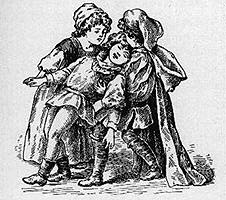
When Orlando told Ganymede how his brother was to be married on the morrow, he added: "Oh, how bitter a thing it is to look into happiness through another man's eyes."
Then answered Rosalind, still in Ganymede's dress and speaking with his voic--"If you do love Rosalind so near the heart, then when your brother marries Aliena, shall you marry her."
Now the next day the Duke and his followers, and Orlando, and Oliver, and Aliena, were all gathered together for the wedding.
Then Ganymede came in and said to the Duke, "If I bring in your daughter Rosalind, will you give her to Orlando here?" "That I would," said the Duke, "if I had all kingdoms to give with her."
"And you say you will have her when I bring her?" she said to Orlando. "That would I," he answered, "were I king of all kingdoms."
Then Rosalind and Celia went out, and Rosalind put on her pretty woman's clothes again, and after a while came back.
She turned to her father--"I give myself to you, for I am yours." "If there be truth in sight," he said, "you are my daughter."
Then she said to Orlando, "I give myself to you, for I am yours." "If there be truth in sight," he said, "you are my Rosalind."
"I will have no father if you be not he," she said to the Duke, and to Orlando, "I will have no husband if you be not he."
So Orlando and Rosalind were married, and Oliver and Celia, and they lived happy ever after, returning with the Duke to the kingdom. For Frederick had been shown by a holy hermit the wickedness of his ways, and so gave back the dukedom of his brother, and himself went into a monastery to pray for forgiveness.
The wedding was a merry one, in the mossy glades of the forest. A shepherd and shepherdess who had been friends with Rosalind, when she was herself disguised as a shepherd, were married on the same day, and all with such pretty feastings and merrymakings as could be nowhere within four walls, but only in the beautiful green wood.
